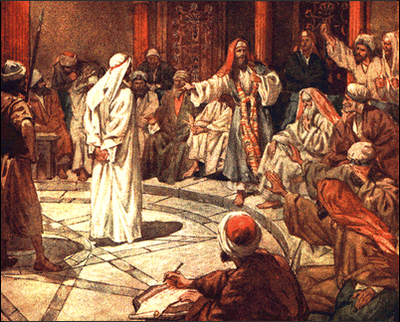
When they had brought them, they stood them before the Council. The high priest questioned them, saying, “We gave you strict orders not to continue teaching in this name, and yet, you have filled Jerusalem with your teaching and intend to bring this man’s blood upon us.” But Peter and the apostles answered, “We must obey God rather than men” (Acts 5:27-29).
The recent controversy between the Obama administration and the Roman Catholic bishops regarding contraception and health care is a precursor of things to come.
The federal government has decided that freedom of religious exercise in the United States is limited to private expressions of devotion. Worship in an established church will be tolerated for now, but any public exercise of religious conviction that contradicts the public policy of the government will not be tolerated. This means that religious institutions that have been established to assist the church in its public ministry of mercy, education, and evangelism will not be allowed to exercise the conscience and convictions of the church. Catholic hospitals must perform abortions. Catholic universities must provide insurance which guarantees free contraception. The secularist are not content to control the curriculum of public education, they will seek to influence the curriculum of private religious schools as well. These efforts by the federal government seek to rob the religious community in the United States of their public voice and influence.
The first amendment of the Constitution of the United States declares, “Congress shall make no law respecting an establishment of religion, or prohibiting the free exercise thereof; or abridging the freedom of speech, or of the press; or the right of the people peaceably to assemble, and to petition the Government for a redress of grievances.” The purpose of the first amendment is to protect religious institutions, the press, and all other organizations from the power of the federal government. The purpose of the “separation of church and state” has historically been understood as protecting the church from the state. Now, it is being understood as protecting the public policy of the government from the influence of religion. This is not only an assault on the freedom of religious exercise, but also an assault on all forms of religious speech and expression.
We can see the future of religious freedom in the United States if we look to France. The French Declaration of the Rights of Man and of the Citizen guarantees freedom of religion, as long as religious activities do not infringe on public order in ways detrimental to society. In France, religious freedom is subject to the needs and policies of the state. The French government seeks to protect French society from the encroachment of religious groups. In other words, any religious group that is deemed to undermine the public order may be suppressed by the state. How is this expressed in French society? French society is secular. Religious expression is suppressed in all things public.
When the threat of communism dominated the political culture of the west, President John Kennedy visited Berlin and declared, “Ich bin ein Berliner!” (I am a Berliner!). Almost twenty-five years later, Ronald Reagan stood at the Brandenburg Gate in Berlin and challenged Soviet oppression by declaring, “Mr. Gorbachev, tear down this wall!” In that spirit, as the forces of secularism threaten religious liberty, all Christians in the United States must proclaim, “We are all Catholics!” and “Tear down this law.” If the federal government succeeds in forcing Catholic institutions to support public policy in contradiction of their religious convictions, then the battle for religious freedom in the United States will be lost. The Christian voice in public policy will be lost. Then with the apostles we must declare, “We must obey God rather than men” (Acts 5:29).
